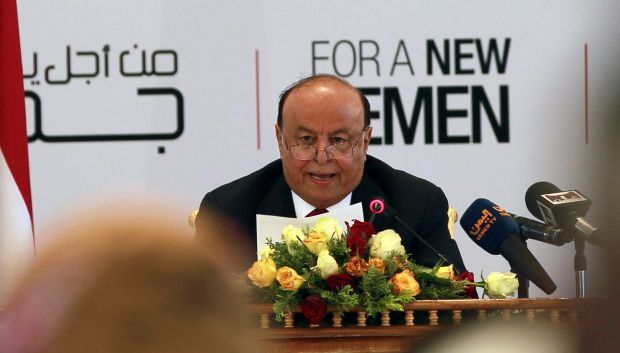
Yemen’s President Abd Rabbuh Mansur Hadi speaks during the closing ceremony of a national dialogue conference aimed at drafting a new constitution and establishing a federal state on January 25, 2014 in Sana’a. (AFP Photo/ Mohammed Huwais)
Sana’a, Asharq Al-Awsat—Yemen’s embattled President Abd Rabbuh Mansur Hadi has sought to stymie the latest wave of popular protests against his government with a Cabinet reshuffle that has seen the appointment of new ministers of oil, electricity and finance. The move comes after several days of power outages and fuel shortages, with reports that thousands of people had taken to the streets of the capital on Wednesday in protest against a three-day city-wide power cut.
The Cabinet reshuffle saw a total of six Yemeni ministerial portfolios change hands, including the appointment of Jamal Abdullah Al-Salah as Minister of Foreign Affairs, Nasser Taha Mustafa as Minister of Information, and Ahmed Obaid Bin Daghr as Minister of Telecommunications. Abdullah Mohsen Al-Akwa’a was appointed Deputy Prime Minister and Minister of Electricity; Ahmed Abdul Kader Shaia was appointed Yemen’s Minister of Oil and Minerals, and Mohammed Mansour Zemam was appointed Minister of Finance.
Observers and analysts portrayed the Cabinet reshuffle—the second by Hadi since he took office in 2012—as an attempt to put the brakes on an anti-government protest movement that has been gathering pace in recent days over lack of services and security. The ongoing power outages across the capital, Sana’a, comes after saboteurs shut down the national grid by attacking power lines earlier this week.
Yemen has been witnessing security unrest, with both Shi’ite Huthi rebels and Sunni extremist Al-Qaeda in the Arabian Peninsula (AQAP) fighting against the central government.
The central government launched a major military offensive in the south of the country to root out AQAP members, with the Interior Ministry hailing the success of the operation.
Yemeni forces and Shi’ite Houthi rebels agreed a ceasefire deal in the northern province of Amran last week following recent clashes between the two sides. Hadi has appointed a special committee to oversee the truce.
Yemeni official sources said the president is seeking to gain the support of Southern Movement opposition figures at home and abroad, hoping they will begin participating in the political process following the success of the National Dialogue Conference earlier this year. The president is reportedly in contact with Yemeni opposition figures abroad, calling on them to return to the political process.
A Yemeni opposition figure, speaking to Asharq Al-Awsat on the condition of anonymity, said: “The Yemeni president’s attempts to attract Southern figures will not succeed and will be unable to kill off the Southern issue or quell the peaceful Southern Movement.”
“The major leaders of the Southern Movement, which is playing an active role in what is happening on the street, will never agree to join with Hadi. There are real issues on the ground” that must be addressed, the Southern opposition figure added.
